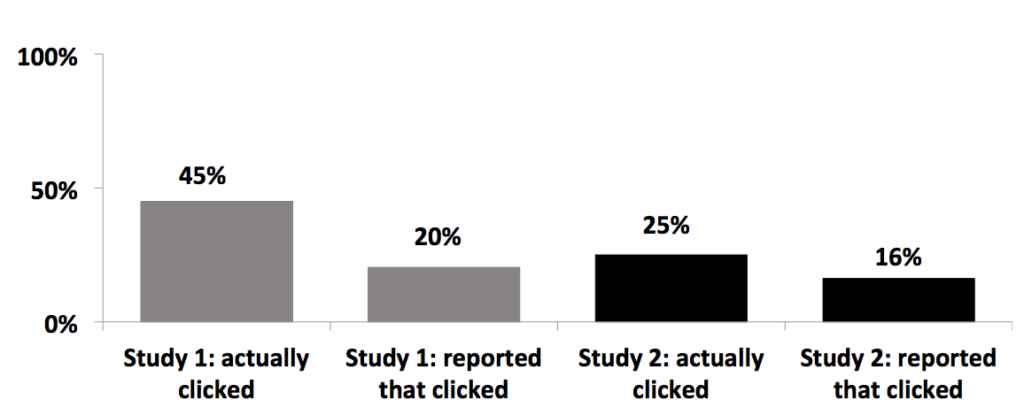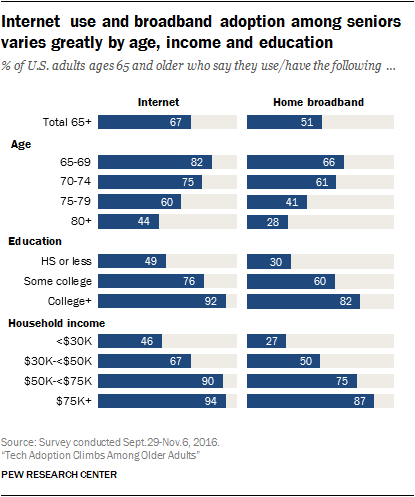
Cybersecurity is becoming increasingly important nowadays. According to the latest statistics, more than 230,000 new malware samples released every day. In the first half of 2017, there were more than 319,000 ransomware infections on the network, an increase of 137.5% compared to 2016, where only 4,000 attacks per day were committed.
Not just the large companies that operate online face security threats but also anyone who surfs the Internet is a potential victim of cybercriminals. In fact, many claim that they are fully aware of cyber threats. But surveys show that subjective knowledge is a weak predictor of higher cybersecurity. For example, two studies conducted in 2016 by a group of researchers found that 76% of respondents said they were aware of the dangers of unknown links in e-mails. Many of them clicked on them anyway. Ultimately, their excessive self-confidence in real life would have led to malware on her computers.

The percentage of those who clicked on unknown links, although they stated they were aware of the potential dangers. Source: Friedrich Alexander University
If cyber crime cases continue to evolve at its present rate, it could easily become the biggest threat to anyone around the world. To help you minimize the risks, we have taken a rather unique approach and created this Cyber Security Guide for the entire family.
In particular, we’ll show you how best to explain cybersecurity to 5-year-old children and 90-year-old grandparents.
And it will be a fun challenge.
How to Explain a 5-Year-Old Cyber Security
Many adults are overwhelmed by this task because children do not understand what a ransomware attack is and how it affects a computer. However, it is highly recommended to start talking about online safety as soon as possible, as most children start using the Internet.
The biggest cyber security threats for children of this age are:
- Links to malicious websites,
- malware,
- Drive-by downloads and
- Viruses.
As you can see, the threats are similar to those affecting adults. However, the way cybercriminals try to get children is quite different. For example, an adult may be tempted to download any software while a child may be made to click on a link to a “fan site” containing many free media containing malware. The kid might be tempted to get free music or videos, but it may not realize they are catching a virus instead.
How do you explain cyber security to a child?
The best way is to talk to him about it. Tell him there are people trying to exploit others by stealing their private information or their money. These people may use different methods to get what they want. So it’s always better not to download something or visit a website if it looks suspicious.
“Advise the child not to do any online activities that would not be done in real life,” says Alan Green, an AWriter cyber security expert . “For example, accepting a friend request from a complete stranger and beginning a conversation can be compared to starting a conversation with a complete stranger on the street.”
Teach them the following basics for cybersecurity:
- Do not use a name in a password.
- Do not install apps without permission.
- Do not share passwords except with the family.
- Add only people who know them on social media.
- Do not upload pictures of people without them knowing.
Tell them that the sense of protection in the distance between them and a stranger can tempt them to go one step further. But that is dangerous. The stranger can steal some very important data without them realizing it. So it’s better not to have relationships with people you do not know.
safety tips
- If necessary, create an email account for your child and monitor the messages it receives.
- Surf online only in the usual family areas, where you can see what the child is doing.
- Use kid-friendly search engines ( Kiddle, KidRex, and Safe Search Kids ).
- Check the privacy settings in the devices used by your children.
- If you need to give your child a cellphone for security, buy a cell phone designed for children.
- Set the web browser to block popups and disable Java.
How To Explain Cyber Security To A 90-Year-Old
The proportion of senior citizens using the Internet has grown steadily over the past decade. According to the Pew Research Center, in 2000, only 14 percent of US seniors aged 65 and over surfed the Internet regularly.
In 2017, however, the proportion of older Internet users rose to 67 percent , which represents a significant increase.

Percentage of US adults over the age of 65 using the Internet. Source: Pew Research Center
Older adults did not learn how to handle technology until later than younger generations because they did not have computers in school. Therefore, they were not sufficiently trained in cybersecurity. As a result, many of them have no idea that criminals are trying to obtain their personal or financial information.
However, as seniors increasingly use digital media for their own purposes, they need to be told how to be safe online. Some governments have even set up dedicated websites to provide seniors with the information they need.
If you explain cybersecurity to a senior citizen, it should include the following messages:
- The Internet is not a safe place, because any computer can be a simple target for cybercriminals.
- Unsafe websites that do not have a security certificate should be avoided. Look for HTTPS at the top of the URL.
- An e-mail from an unknown source should not be opened.
- Anti-virus software must be installed to prevent threats.
A number of helpful Internet resources designed specifically for seniors can also be used.
A good example is Seniors Online, a web resource created by the state government of Victoria in Australia. It has an entire area devoted to teaching seniors in cybersecurity. It offers self-paced tips, guides, and other helpful information that you can use to teach your loved ones.
There are also services like Meganga that offer free computer lessons for seniors through online videos. Cyber security is also taught here.
Tips for protecting your elderly relatives online:
- Protect your computer by installing anti-virus software, disabling Java, and setting the browser to block pop-up windows.
- Teach them how to create strong passwords for their online accounts.
- Train them in the use of e-mail. Teach them to never open emails from unknown senders.
- Teach them how to react to anti-virus alerts and warnings generated by the software.
Training in cybersecurity is important to everyone
Because every one of us uses the Internet on a regular basis, it is better for everyone, regardless of age or surfing habits, to receive basic cyber security training. Here’s a list of cybersecurity tips to better protect yourself and your loved ones when you’re online.
- Create strong passwords. A good, strong password should be long and complex, containing lowercase letters, uppercase letters, symbols, and numbers. Use password managers like Dashlane to create a non-crackable password.
- Use internet security software. Your device – computer, laptop, tablet or smartphone – should be equipped with reliable antivirus software. Update these regularly.
- Adjust the security settings of the browser. Most popular browsers, such as Google Chrome, Firefox, and Opera, have special settings that can block potentially harmful resources, such as pop-up windows. Adjust these settings accordingly to increase your safety.
- Remember to log out. If you’ve visited a website or stopped an app, make sure you have unsubscribed from it. Because if you leave them open, your data becomes more vulnerable.
- Think twice before clicking on links in emails. You are likely to receive news from cyber criminals that make them very convincing. Often, however, there are links to imitators of popular sites that ask you to enter various information, such as credit card numbers and passwords.
- Be careful with what you download. There are so many resources that sometimes we do not think about what we download. Of course, there are many legitimate secure content sites on the Internet, as well as those that offer malicious content full of malware. This also applies to e-mail attachments – be careful with unexpected or strangely named files!
The most important points
The bottom line is that we are the ones responsible for our online actions. The vast majority of internet security breaches happen due to carelessness.
Almost everyone today uses the Internet, including most adults and teenagers, and a growing number of young children and seniors. Regardless of their age, everyone can be safe online if they follow the basic rules of safety described in this guide.
Of course, no one can eliminate all possible risks associated with the online activity, but taking proper precautions can significantly reduce the risk.
Contact us today to learn about Bleuwire™ services and solutions in how we can help your business.





